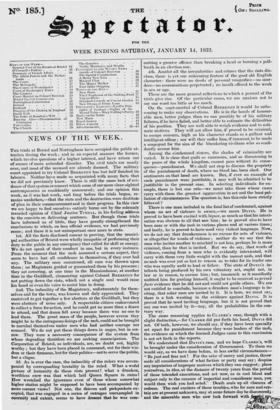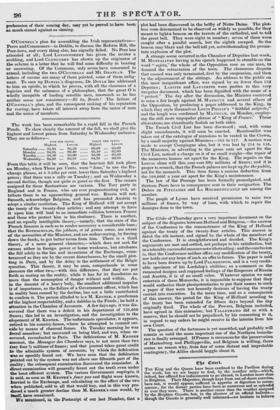NEWS OF THE WEEK
THE trials at Bristol and Nottingham have occupied the public at- tention during the week; and in an especial manner the former, which involve questions of a higher interest, and have arisen out of scenes of more extended disorder. The civil trials are nearly over, and most of the accused are already doomed. The military court appointed to try Colonel BRERETON has but half finished its labours. Neither have made us acquainted with many facts that we did not previously know. There is still the same lack of evi- dence of that system or concert which some of our more clear-sighted contemporaries so confidently announced ;• and our opinion this week, as it was last week, and, long before the trials began, re- mains unshaken,—that the riots and the destruction were destitute of plan in their commencement and in. their progress. In this view we are happy to find our' selves entirely borne out by the solemnly recorded opinion of Chief Justice TINDAL, in his feeling address to the convicts on delivering sentence. But though these trials have informed us of little, they have greatly strengthened the conclusions to which, on less official evidence, we had previously come; and these it is not unimportant once more to state.
1st. All the facts disclosed concur in proving, that the munici- pal authorities of Bristol were wholly incapable of performing their duty to the public in any emergency that called for skill or energy.
We do not speak of their conduct in one, but in every instance. From the moment that the mob assumed a serious aspect, they seem to have lost all confidence in themselves, if they ever had any. The military once summoned, all care was thrown upon them; no Magistrate guided or guaranteed them by his presence; they sat cowering, at one time in the Mansionhouse, at another time in the Guildhall, clamouring against Colonel BRERETON for not putting down the riots, which not a single soul would raise his hand or even his voice to assist him in doing.
2nd. The imbecility of the Magistracy, unfortunately for them- selves arid for the town, was known and duly appreciated. They contrived to get together a few abettors at the Guildhall, but they were abettors of noise only. A respectable citizen endeavoured to collect a force for action, and he could get no more than a dozen to attend, and that dozen fell away because there was no one to • lead them. The great mass of the people, however averse they might be to the Outrageous doings of the mob, could not be brought to marshal themselves under men who had neither courage nor counsel. We do not put these things down in anger, but in sor- row. They were a necessary consequence of the system from whose degrading thraldom we are seeking emancipation. The Corporation of Bristol, as individuals, are, we doubt not, highly worthy ; but they have been placed in command, not for their wis- dom or their firmness, but for their politics—not to serve the public, but a clique.
3d. As is ever the case, the imbecility of the rulers was accom- panied by corresponding brutality in the ruled. What a woful picture of humanity ,do these riots present!, wbat a drunken, worthless crew was that which laid Queen Square in ruins! How wretched the ignorance even' of those whose somewhat higher station might be supposed to have been accompanied by more correct views ! Not one, the thieves and pickpockets ex- cepted, that was engaged in a series of outrages unexampled in enonnitk and extent, seems to have dreamt that he was coma- _ . mitting a greater offence than breaking a head or burning a poll- booth in an election row.
4th. Amidst all 'the irregularities and. crimes that the riots dis- close, there is yet one redeeming feature of the good old English character : there Were no deeds of personal vengeatice—no mur- ders—no assassinations perpetrated ; no insult offered to the weak in sex or age.
These are the more general reflections to which a perusal of the trials give rise. Of the particular cases, we are anxious not to say one word too little or too much. .
On tilt. 3ourt-martial of Colonel BRERETON it would be unbe- coming to make any observations. He is in the hands of honour- able men, better judges than we can possibly be of his military failures, if he have failed, and better able to estimate the difficulties of his position. They are well able to weigh evidence and to esti- mate motives. They will not allow him, if proved to be criminal, to escape censure, high aS his character stands as a gallant and . intelligent officer; nor will they suffer him, if innocent, to be made a scapegoat for the sins of the' blundering civilians who so confi- dently aecuse him.
Among the dondemned: rioters, the shades of criminality- are varied. It is clear that guilt so enormous, and so threatening to the peace of the whole kingdom, cannot pass without its conse- - quence—punishment. • We shall not stop to discuss the propriety of the punishment of death, where no blood has been shed. Our sentiments on that head are known. But, if ever an example of' such punishment were justifiable, it may well be admitted to be juStifiable in the, present case. In selectinc, individuals for ex- . ample, there is but one rule—we must take those whose cases' carry with them the, greatest aggravation in act and the least pal- - liation of cimun.astances. The question is, has this rule been strictly : followed?
There is. one man included in the fatal list of condemned, against whom no act of violence is sworn,—we mean DAVIS. He is proved to have been excited with liquor, so much so that his intoxi- cation was obvious to all that saw him ; he is proved also to have been near or with the mob in various places and at various tunes ; . and lastly, he is proved to have used very violent language. Now, we do not say that drunkenness is an excuse for acts of violence, , or altogether for words of violence ; neither do we say that the man who incites another to mischief is not less, perhaps, he is, more • criminal, than he that is incited. But we do say, :that words of. violence, coming from a man who is evidently intoxicated, will • carry with them very little.weight with the merest mob, and that : no' mob was ever yet so lost to . reason as to take for its leader one - who was equally unfit to lead or follow. The state of DAVIS'S in-' tellects being produced by his own voluntary act, ought not, in law or in reason, to excuse him; but, inasmuch as it manifestly ! unfitted him for guiding himself, it ought to be received as prime - facie evidence that he did not and could not guide others. We are, not entitled to conclude, because a drunken man's, language is in- citing, that sober men are incited by it. It is here, we must say, there is a link wanting in the evidence against DAVIS. It is - proved that he used inciting language, but it is not proved that. anyone was incited by itnay, all the probabilities lie the con-.
tmry. way; . , The, same reasoning applies to CLARKE'S case, though with a, slight distinction,—for CLARKE did put forth his hand, DAVIS did , not. Of both, however, we should say, if they have been specially : set apart for punishment because they were leaders of the mob, the evidence on which the learned Judges came to this conclusion: is not set forthin the reports. .
We understand that DAVIS'S case, and we hope CLARKE'S, Will; be brought under the consideration of Government. To them we . would say, as we have done before, in less awful circumstances— - ". Be just and fear not ! For the sake of mercy and justice, throw.: aside'all considerations of what faction or party may say; despise' any imputation of improper motives which they can suggest; place, yourselves, in idea, at, the distance of twenty years from the period, of these intended executions, and act - new, as in cool blood and' subject only to, the censure of impartial and considerate men, you' would then wish you.had acted." Death seals up all chances, ofi - redress. The real exciters of these troubles, who for sure and:cer-- - tain are at present unknown, may at sole future day be discovered;, prehension of their coming day, may yet be proved to have been as much sinned against as sinning.



























 Previous page
Previous page